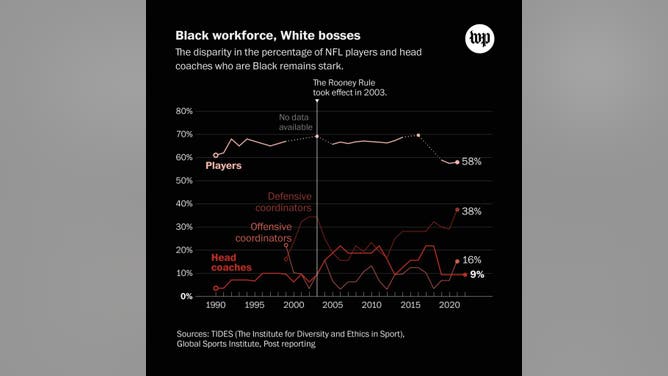Washington Post, Yet Again, Claims There Aren't Enough Black Head Coaches in NFL Because Of Racism
There's nothing in the world that progressive activist institutions like the Washington Post can't blame on supposed racism.
In an extremely lengthy, infographic laden piece, the Post made the case that the Rooney Rule has failed. The rule requires NFL teams to interview minority candidates for head coaching positions.
No mention of those "End Racism" banners on NFL fields.
The key takeaway from the dissertation is that there are only three black head coaches in the NFL this year. The Post contends it is a failure of equity due to double standards and owner bias.
Equity means trying to achieve equal outcomes instead of equal opportunities. Despite taking over corporate HR departments, woke CEO lingo and social media messaging from progressive organizations, equity is a nonsensical ideal that's entirely unachievable and can lead to discrimination and racism on its own.

JACKSONVILLE, FL - SEPTEMBER 13: The words End Racism are painted in an end zone for the game between the Indianapolis Colts and the Jacksonville Jaguars on September 13, 2020 at TIAA Bank Field in Jacksonville, Fl. Photo by David Rosenblum/Icon Sportswire via Getty Images)
But as usual, beyond their promotion of such a ridiculous idea, the Post only provides portions of context. It makes wild speculations with no basis in fact, and confuses correlation with causation.
One of the most absurd contentions is that because black coaches are more likely to be named interim coaches, it shows that owners only put them in positions to fail:
"Black coaches are much more likely to be tapped as interim coaches than for full-time roles, indicating a willingness by owners to entrust their teams to Black leaders only when success is out of reach."
This is ludicrous; a purposeful misdirection from reality, which is that black representation as a proportion of assistant coaches has grown over time. As such, there are more opportunities for black coordinators to become interim head coaches if their boss loses their job.
That's not opinion, it's backed up by the data analysis:

Notice how the percentage of black defensive coordinators has risen dramatically in recent years? Offensive coordinators have also risen substantially as well.
That's almost certainly provided more opportunities for interim head coaching appointments, since there's been more black assistants to choose from.
The substantial rise in defensive coordinators also indicates that black coaches are being increasingly entrusted with important positions, even though head coaching percentages have not gone up dramatically yet.
Misleading Claims
The story then makes the assertion that white coaches are more likely to be offered full-time jobs after serving as an interim:
"Serving as an interim coach can be a path to a full-time job — but it’s a rockier road for Black coaches. Black coaches have held interim roles 14 times since 1990, and they were retained on a permanent basis just three times. All three — Romeo Crennel with the Kansas City Chiefs, Leslie Frazier with the Minnesota Vikings and Mike Singletary with the San Francisco 49ers — posted at least a .500 record during their interim stints. For White coaches, full-time job offers have had no correlation with their records as interim coaches."
Except that interim head coaches are rarely hired permanently, regardless of race.
There's also no indication of how many games the interims coached. For example, if someone went 2-1, that would count as an over .500 record, even though it's an absurdly small sample size. How many coaches of either race finished 1-0, or 0-1? Records in those cases would be meaningless.
These assertions combined with several other bizarre insinuations thoroughly discredit the case.
Another example of this is the claim that black coaches are directed away from offensive coaching roles:
"The leaguewide push to hire young, offensive-minded coaches with experience coaching quarterbacks also has shut out Black coaches, who for decades largely were steered away from offensive coaching opportunities."
There's quite simply no evidence for the claim that black coaches have been "steered away from offensive coaching opportunities."
It's entirely speculation, based on the Post needing it to be true for the "point" to be accurate.
Problematic Data
But the headline accusation is that the percentages of firings are wildly different between black and white head coaches.
Except the gaps are absurdly small and under-explained:
"Since 1990, Black full-time head coaches have led teams to a .500 record or better in 78 regular seasons. In 9 percent of those instances, those coaches were fired afterward. In the same stretch, White coaches who met that benchmark were fired just 4 percent of the time.
Black coaches who have won at least six games in a season have been fired afterward 12 percent of the time, compared with 8 percent of White coaches. When they win at least nine games in a season, Black coaches are fired 8 percent of the time, compared with 2 percent of White coaches."
These percentages are small enough to be entirely useless given the sample sizes involved.
With 78 regular seasons of .500 or better records, 9% means that 7 black head coaches were fired after winning records in the past 32 years. There's no explanation of what their career records were, what the trend in records were before the firing, nothing. It's simply correlation with no causation and vanishingly few details.
And again, with such small sample sizes, any one firing can wildly swing the outcomes.
But the Washington Post doesn't care, because it must be racism.
Rampant Speculation
There are so many problems with the analysis it's hard to know where to start. But the Post got what it wanted; media attention for generally unsupported claims.
It may be true that owners prefer to hire white coaches who are similarly qualified, which would be indefensible and racist behavior. Certainly, we know from recent stories that racism amongst sport teams owners exists.
But there's no data in this article to justify that assertion, just speculation.
It also ignores any other racial backgrounds and how many head coaches there are or aren't. There haven't been many Hispanic head coaches, nor Asian. Why isn't the Post concerned about that?
"Equity" often leads to the absurd belief that every decision must be viewed through the lens of race.
When all you have is a hammer, everything looks like a nail.
Even if the nail may not actually even exist.